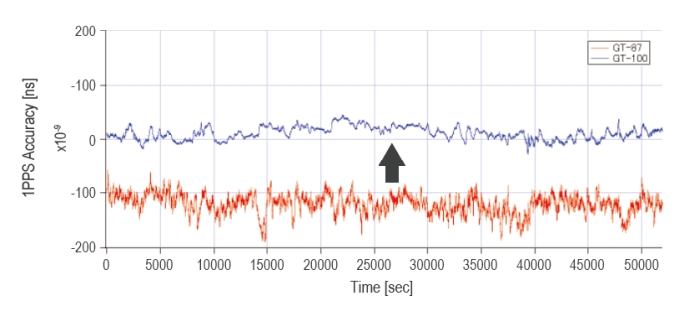 View larger
View larger GT-100 
Timing dual-band GNSS Receiver Module and programmable clock outputs
- Unrivalled performance for 5G RAN, Radio Systems, Time servers
- Dual Band, supporting all constellations
- Highly precise time & ultra-low jitter 1PPS synchronizes with UTC
- High Robustness - guaranteed performance even if only L1 or only L5 are used
- Programmable frequency clock outputs synchronized with UTC
- Excellent performance even in harsh environments
A lineup of three models offering a variety of input and output options for all timing requirements
Delivers clock outputs and 1PPS synchronized with UTC time
The GT-100 delivers accurate 1PPS synchronized with UTC with high resolution.
The GT-100 also includes three output clock signals.The three outputs can be arbitrarily assigned to 1PPS and clock.
The GT-100 clock outputs can be set as required to 10MHz, 2.048 MHz, 19.2 MHz, and 30.72 MHz, which are commonly used in wireless communications.
This shortens the time-to-market and contributes to strengthening the customer's competitiveness.The world's highest level of stability of less than 4.5ns (1sigma) under open sky.
Compliant with G.8272 PRTC-A and PRTC-B
Compliant with TDEV (Time Deviation) /MTIE (Max Time Interval Error).
Exceeds the most stringent requirements in 5G networks.
Choice of single or dual band for worldwide GNSS support
Multi constellation capability supporting GPS, GLONASS, Galileo, Beidou, QZSS and SBAS from various countries.
The dual-frequency band GT-100 can also receive India's NavIC (L5) signals.
The GT-100 can be used with a selection of positioning satellites or all of them concurrently, making it ideal for globally deployed 5G mobile base stations and network equipment.High robustness with dual-frequency band reception of L1 and L5
Dual-frequency band positioning mitigates the effects of ionospheric delays caused by solar flares, etc.
Time stability of less than 4.5ns (1σ) is achieved even when receiving only L1 or L5.World's lowest accuracy degradation in harsh urban multipath environments
The use of GNSS receivers for time synchronization is growing vastly into urban areas where multipath signals are mixed and cause severe degradation of timing accuracy. Our proprietary "Dynamic Satellite Selection™*" technology, which appropriately chooses only the high quality satellite signals, minimizes degradation of time synchronization performance in poor reception environments.
This technology can be used safely even at base stations installed in urban areas.
* Multipath resistance technology based on an algorithm developed by NTT
Protecting GNSS Reception (Anti-Jamming, Anti-Spoofing)
The GT-100 mitigate the effects of jamming signals automatically and to provide real-time notification to the user of the jamming signal frequency and signal strength.
The modules enhance receiver security and identify the source of jamming during the operational phase of a customer's system.
The GT-100 also implement a detailed algorithm to verify the correctness of GNSS signals and can detect and eliminate spurious signals that are not broadcast from the satellites.
The GT-100, which supports dual-frequency band reception, also has the ability to operate only on L5 if L1 is jammed, or only on L1 if L5 is jammed.Short term holdover
Interruption of GNSS satellite signals is a major concern during operation of critical infrastructure systems.
GT-100 support short term holdover, which maintains constant performance even if GNSS satellite signals are interrupted for a short period of time.External clock input
GT-100 accept an external time reference input (1PPS, clock) that is different from that of the GNSS satellites. The input can be derived from an external clock, enabling the modules to continue to provide service even in the unlikely event of loss of signal from the GNSS satellites.Carrier Grade Quality. Suitable for critical infrastructure applications
Compared to conventional GNSS receivers for time synchronization, Furuno's new GNSS receivers are substantially more robust (i.e., they are not affected by most disruptions and thus ensure continuous service).
Such enhanced features give users a high level of confidence in fields that require high reliability, such as 5G mobile base stations, financial transactions, and power grids.
A Carrier Board version is also available. Click here to learn about the NLC-RCB-GT-100.
| Description | Part-Number |
|---|---|
| GT-100 | GT-100 |

